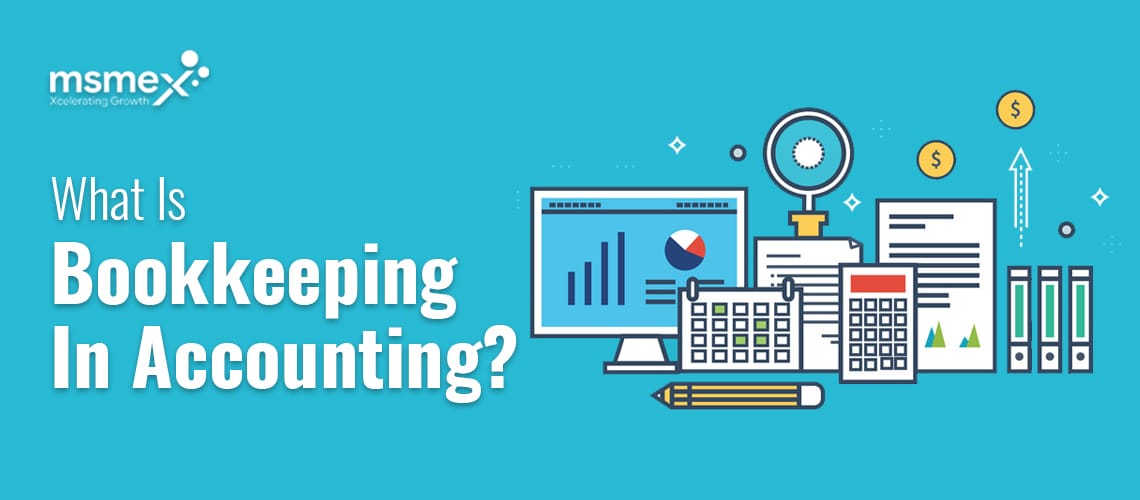Bookkeeping is one of the essential aspects of accounting. Whether you own a small business or an MNC, recording, tracking, and maintaining organized transactional details is necessary. And that’s what a bookkeeper exactly does to your business.
It is a process of organizing and tracking day-to-day transactional data. Do you want to know more? In this article, you’ll learn the definition, examples, types, and significance of bookkeeping. So, without beating around the bush, let’s get started.
What is Bookkeeping in Accounting?
In simpler words, Bookkeeping in accounting is the systematic process to store, organize, and track the business transactional data. It is one of the most significant parts of accounting that allows the smooth financial functioning of the business.
An expert bookkeeper manages the daily business transactions to track the budget in the long run. To be more specific, in this process, the bookkeepers track finances, including sales, wages, loans, investments, debts, interests, and other related data—usually, an accountant tracks and analyses the finances and their related details.
Do you want to know more?
Here are a few examples of bookkeeping that you should consider.
- Tracking the customer payments.
- Providing precise bills for the sold services or goods.
- Verifying and storing invoices, supplier’s payments, and receipts.
- Keeping a record of balance accounts, historical data, and general ledgers.
- Record profits and debs.
In a nutshell, Bookkeeping helps to analyze the business’s financial status. Managing the general ledger is the crucial responsibility of the business bookkeepers. If you’re new to the term “General Ledger,” let me explain to you here.
It’s basically a core or fundamental document to store all the financial data. In technical terms, recording on the ledger is commonly known as “Posting.” Since there are tons of software designed in the market to automate the systems, Bookkeeping has become pretty effortless. However, the complexity of this process completely depends on the type of business and the person managing it.
Suppose, Bookkeeping is pretty complex for large businesses or corporations receiving thousands or hundreds of orders each day. In comparison, this process is comparatively less burdensome for micro or small businesses taking a few tens of orders.
Major Difference Between Bookkeeping & Accounting
Most people often confuse Bookkeeping and accounting. If you’re also in the same state, it’s time to dwell on the differences between the two in detail.
In this section, you’ll understand the crucial difference between accounting and bookkeeping in terms of education, responsibilities, and certifications.
- Bookkeeping doesn’t require any formal graduation degrees like accounting. All you need to become a bookkeeper is a handful of training with certifications. In concerts, accounting requires a bachelor’s degree with good grades.
- It deals with daily transactional activities while the accountant maintains higher deals such as tax planning and more complex financial aspects.
- Accountants provide overall business financial solutions to maintain a stable business environment. They often advise on the business expansions obeying rules and regulations. Bookkeeper tracks the ins and outs of the money every day without entering the overall financial health complexities.
- Accounting requires a Certified Public Accountant license that adds to their credibility.
- The bookkeeper maintains and processes payroll taxes while the accountant processes entire business and personal tax returns.
These are the few differences that everyone should know about.
Significance of Bookkeeping
Is bookkeeping really significant? The simple answer is Yes. It helps to track the accurate financial status of the business, records cash flow, and detects fraudulent or suspicious activities. If you still think that bookkeeping is of no use, imagine a business without tracking or recording cash flows, invoices, bills, etc.
Learn more about – Cash Flow Management For New Small-Businesses And MSMEs – Recommendations To Drive Business Forward
Have you ever tracked your monthly budget? If yes, you perhaps understand the importance of bookkeeping. Or else, if you don’t even bother about financial tracking, you might understand the pain of not keeping organized financial records. Isn’t it? This is the reason whether it’s micro, small, medium businesses or fortune companies; bookkeeping plays a vital role.
Furthermore, the detailed business day-to-day transactional records help prepare the balance sheet. In addition, it also helps businesses while processing loans. The accurate and updated financial records form a robust foundation of the business.
Importance of Bookkeeping
- It tracks business sales, profits, interests, debts, recipes, bills, investments or good purchases, and other financial-related operations.
- It produces an accurate balance sheet, cash flow and maintains general ledger records.
- It stores fundamental financial records of the business.
- It answers basic financial questions such as whether the company is running in profits or losses, its financial status, its net worth, etc.
Learn more about – Building Financial History Records For MSMEs – Know The Importance Of Cash Flow Statement And Income Statement for MSMEs
Types of Bookkeeping
There are primarily two types of bookkeeping – single-entry and double-entry. Let’s discuss each of them in detail.
1. Single-Entry
This is one of the beginner-friendly bookkeeping methods mostly used by individuals, small, or micro-businesses. This method has a single record entry. In general, a single-entry system works well for companies or businesses without any proper assets.
2. Double-Entry
Unlike single-entry, this method records entries twice for each transaction processed by the company. Large companies or businesses leverage this method for accurate data. In general, this type of bookkeeping is highly effective and powerful.
For instance, let’s assume you made a $100 sale. Now, both your cash and sales account will be debited for the same $100. The thumb rule in this method is the debit amount always equals the credit amount. Once the business achieves this state, it’s said to be balanced.
Most businesses use the above two types of businesses. However, there are also other types of bookkeeping in accounting, such as – cash-based or accrual-based methods.
- Cash-based method – Usually, cash-based bookkeeping records the transactional data when the money enters or exits from the business accounts. These are recorded only when the business receives or pays the cash.
- Accrual-based method – In comparison, the accrual method is a process of recording earned income of the company. It works excellent when combined with dual-entry bookkeeping.
Experts recommend cash-based or accrual-based methods along with single or double-entry. If you’d like to use the accrual method, it works excellent when combined with dual-entry bookkeeping. At the same time, you can use a cash-based method with single-entry bookkeeping.
Key Takeaways
Bookkeeping is one of the most prominent and important aspects of accounting. Whether you own small or medium businesses, tracking and recording the daily transactions gives you a detailed idea of financial status. As discussed in the earlier sections, there are immense benefits of tracking finances.
One of the most popular benefits is that it helps you find the financial loopholes and fraudulent activities and anticipate business financial stability. If you’ve no idea about how to manage your everyday transactions, here’s a simple idea- hire an expert bookkeeper or accountant to make your work done. Or else, leverage the high-end software, which is efficient as well as economical.
Frequently Asked Questions
-
Is bookkeeping a pretty complicated job?
In simpler words, bookkeeping is one of the most joyous jobs once you understand its fundamental principles. However, if you directly dive into the subject without understanding its fundamentals, you feel hectic and overwhelmed with bookkeeping.
-
How many types of bookkeeping methods are leveraged to date?
There are primarily two types of bookkeeping in accounting, namely, single and double-entry bookkeeping. Companies choose both or any of them depending on their requirements.
-
I own a small business with merely three members. Should I need bookkeeping?
If you observe daily transactions from the business, it’s recommended to maintain bookkeeping which is nothing but keeping the records of day-to-day transactions.
-
What’s the major responsibility of the bookkeeper?
Bookkeeper tracks and verifies the business daily transactional data. He/she is responsible for tracking expenses, sales, interest rates, profits, bills, payments, and payroll taxes.
-
Is bookkeeping and accounting the same?
No. bookkeeping is a part of accounting. While accounting deals with complex financial aspects, bookkeeping maintains and tracks the daily expenses of the business.
Related Read About
- Cash Management Strategy For Small Businesses – 7 Effective Techniques Which You Can Execute Right Now
- What Are Assets? How Assets Help A Small Business Grow? Explore 5 Different Types Of Assets
- What Is TReDS? A Complete Guide To Trade Receivables Discounting System
- Working Capital Optimization – Explore 10 Ways To Improve Working Capital, Its Different Tools, Challenges
- The Fundamentals Of Working Capital And Working Capital Management – Know The Key Features
- Key Factors Of Financial Planning In Business – Financial KPI Examples, Common Misconceptions & Importance Of Financial Plan
- What Is Financial Discipline? How Does Financial Discipline Help Your Business?
- Financial Planning Checklist (Business) – A Complete Guide To Key Factors & Elements Of A Financial Plan
- Why Does A Business Need Financial Planning? How To Create An Effective Plan That Yields Results
- Decoding Profits: How To Find High Profit Margin Business?
- Who Are Investors? What Are The Different Types Of Investors In Business World?







